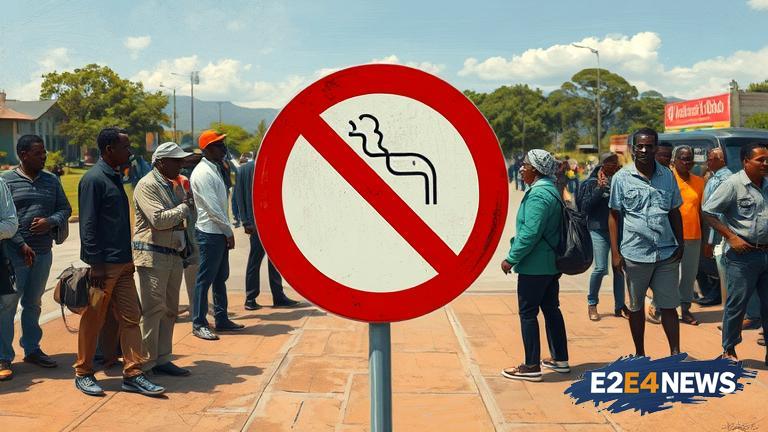Smoking in public has become a major concern in Zimbabwe, with many citizens expressing their discontent with the habit. The government has been urged to take action against smoking in public, citing the harmful effects of secondhand smoke on non-smokers. Secondhand smoke, also known as passive smoke, is the smoke that comes from the burning of tobacco products such as cigarettes, cigars, and pipes, as well as exhaled smoke from smokers. It contains over 7,000 chemicals, many of which are toxic and can cause cancer. Exposure to secondhand smoke has been linked to a range of health problems, including lung cancer, heart disease, and respiratory diseases such as asthma and chronic obstructive pulmonary disease (COPD). Children exposed to secondhand smoke are at risk of developing respiratory problems, such as bronchitis and pneumonia, and are more likely to suffer from asthma. Pregnant women exposed to secondhand smoke are at risk of having a low birth weight baby or a baby with birth defects. The Zimbabwean government has been criticized for not doing enough to protect its citizens from the harmful effects of secondhand smoke. The government has been urged to implement stricter laws and regulations to prevent smoking in public places, such as restaurants, bars, and public transportation. Some countries have already implemented such laws, with significant success in reducing the number of smokers and the exposure to secondhand smoke. For example, in the United States, the number of adult smokers has declined significantly since the implementation of smoke-free laws in public places. In the UK, smoking in enclosed public places has been banned since 2007, resulting in a significant reduction in the number of smokers and the exposure to secondhand smoke. The World Health Organization (WHO) has also called on governments to implement stricter laws and regulations to prevent smoking in public places. The WHO has stated that there is no safe level of exposure to secondhand smoke and that the only way to protect people from the harmful effects of secondhand smoke is to eliminate smoking in all public places. In Zimbabwe, some restaurants and bars have already started to implement smoke-free policies, with some even designating smoking areas outside their premises. However, more needs to be done to protect the public from the harmful effects of secondhand smoke. The government needs to take a stronger stance against smoking in public and implement stricter laws and regulations to prevent it. This can include increasing taxes on tobacco products, implementing public awareness campaigns to educate people about the dangers of smoking, and providing support to smokers who want to quit. Additionally, the government can work with local businesses to implement smoke-free policies and provide incentives to those who comply. By taking these steps, Zimbabwe can reduce the number of smokers, decrease the exposure to secondhand smoke, and improve the overall health and wellbeing of its citizens. It is time for the government to take action and protect its citizens from the harmful effects of secondhand smoke. The public has a right to breathe clean air and live in a healthy environment, and it is the government’s responsibility to ensure that this right is protected. Smoking in public is a serious issue that needs to be addressed, and the government must take a proactive approach to prevent it. By working together, we can create a healthier and safer environment for everyone. The fight against smoking in public is a fight for public health, and it is a fight that we must win. We owe it to ourselves, our children, and future generations to take action against smoking in public and create a smoke-free Zimbabwe.
